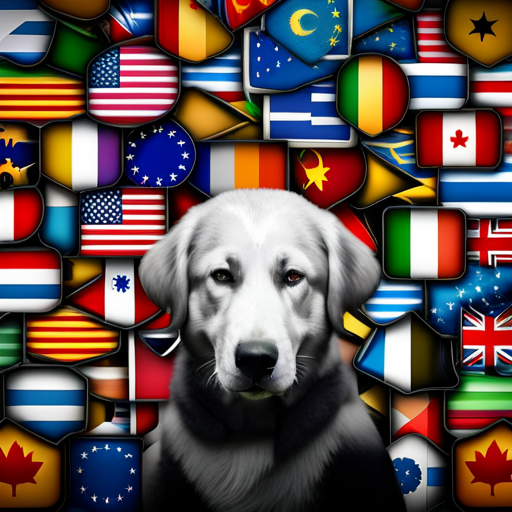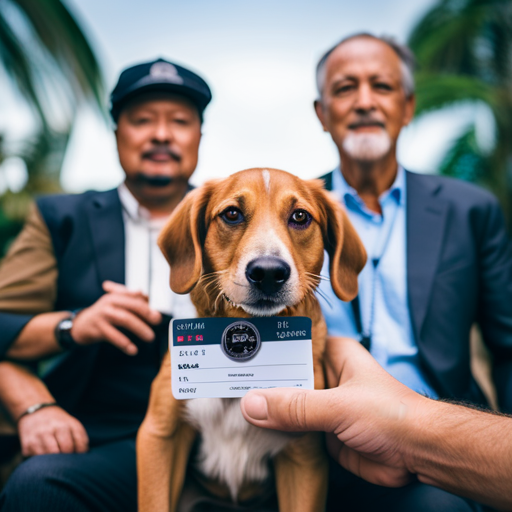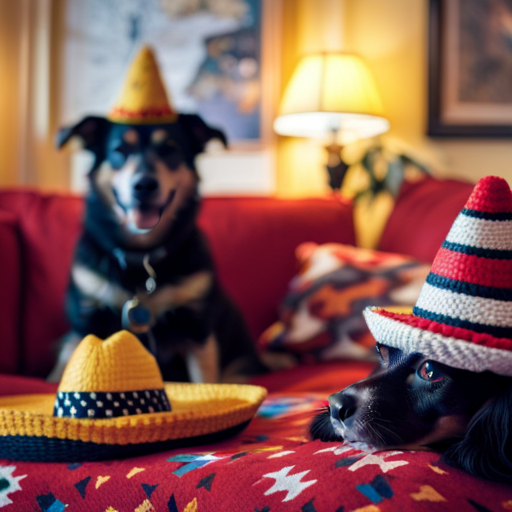Click and GO TO THE BEST DOG NAME GENERATOR HERE
Are you struggling to find the perfect name for your bilingual dog? Look no further! This guide will provide you with expert tips and creative ideas to help you navigate the challenges of naming your furry friend in a bilingual household.
We understand the importance of cultural and linguistic influences, and we’ll help you avoid common mistakes. Get ready to embark on a fun and informative journey to find the ideal name for your beloved companion.
Let’s get started!
Factors to Consider When Naming Your Bilingual Dog

When naming your bilingual dog, you should consider several factors. One important factor is the pronunciation of the name in both languages. It’s crucial to choose a name that can be easily pronounced in both languages, as this will ensure that your dog responds correctly to their name in any situation. You don’t want your dog to get confused or ignore your commands simply because their name is difficult to pronounce in one of the languages.
Another way to incorporate both languages into a single dog name is by using a hybrid name. This means combining words or sounds from both languages to create a unique and meaningful name for your furry friend. For example, if you speak English and Spanish, you could combine the word ‘buddy’ with the Spanish word for friend, ‘amigo,’ to create the name ‘Budamigo.’ This way, your dog’s name represents both languages and their bilingual identity.
Considering these factors will help you choose the perfect name that reflects your dog’s bilingual background and ensures clear communication between you and your furry companion.
Tips for Choosing a Name That Works in Multiple Languages

To ensure a successful name choice for your bilingual dog, consider these helpful tips that will work in multiple languages.
When choosing a name, it’s important to consider pronunciation in both languages. Opt for names that are easy to pronounce and understand in both languages, as this will make it easier for your dog to respond to their name.
Additionally, incorporating both languages’ meanings and symbolism can add depth and significance to your dog’s name. Research words and names that have similar meanings or cultural significance in both languages. This way, your dog’s name will have a special meaning that connects to both your cultural backgrounds.
Exploring Cultural and Linguistic Influences in Dog Names

Immerse yourself in the rich tapestry of cultural and linguistic influences to find the perfect name for your bilingual dog. When exploring the world of bilingual dog names, it’s important to consider the impact of cultural traditions and language preferences. Here are three key factors to keep in mind:
-
Cultural traditions: Names can reflect the unique customs and beliefs of different cultures. For example, in Japanese culture, dogs are often named after qualities such as loyalty or strength. In Hispanic cultures, names may be inspired by popular figures or meaningful words.
-
Language preferences: Consider the languages spoken in your household and the languages you want your dog to understand. Choosing a name that works in both languages can help foster communication and understanding.
-
Personal connection: Ultimately, the best name for your bilingual dog is one that resonates with you and your family. Whether it’s a name that honors your heritage or simply sounds appealing in both languages, choose a name that reflects your love and appreciation for your furry companion.
Creative Ideas for Bilingual Dog Names

As you explore creative ideas for bilingual dog names, consider incorporating elements from both languages to create a unique and meaningful name for your furry friend.
One way to do this is by combining words or phrases from both languages. For example, if you speak English and Spanish, you could combine ‘Luna’ (meaning moon in Spanish) with ‘Buddy’ to create ‘Lunabuddy.’
Another idea is to use famous bilingual figures as inspiration for dog names. For instance, if you admire the Mexican artist Frida Kahlo, you could name your dog ‘Frida’ or ‘Kahlo.’ If you’re a fan of literature, you could consider names like ‘Poe’ (after Edgar Allan Poe) or ‘Neruda’ (after the Chilean poet Pablo Neruda).
The possibilities are endless, so have fun exploring different combinations and inspirations to find the perfect bilingual name for your canine companion.
Common Mistakes to Avoid When Naming Your Bilingual Dog

When naming your bilingual dog, be mindful of common mistakes to avoid. Choosing the perfect name for your furry friend is an important decision that can have a significant impact on training and communication.
Here are three common mistakes to steer clear of:
-
Overly complex names: While it may be tempting to choose a unique and elaborate name, it can make training and communication more challenging. Opt for a name that’s simple, easy to pronounce, and recognizable in both languages.
-
Cultural insensitivity: Be mindful of cultural differences when selecting a name. Avoid names that may be offensive or disrespectful in either language. Research the meanings and connotations of names to ensure they’re appropriate and respectful.
-
Lack of consistency: Consistency is key when it comes to training your bilingual dog. Avoid choosing names that sound similar to common commands in either language, as this can confuse your dog and hinder their understanding.
Frequently Asked Questions
How Can I Ensure That My Bilingual Dog’s Name Is Easy to Pronounce in Both Languages?
To ensure your bilingual dog’s name is easy to pronounce in both languages, try choosing a name with similar sounds or syllables in both languages. Consider cultural significance and choose a name that reflects both languages’ traditions.
Are There Any Specific Cultural or Linguistic Factors That Should Be Taken Into Account When Choosing a Bilingual Dog Name?
When choosing a bilingual dog name, consider the significance of reflecting both cultures in your household. To find a unique name, explore words that resonate in both languages, creating a special bond with your furry friend.
Can I Use a Name That Has Different Meanings in Different Languages for My Bilingual Dog?
Is it important for your bilingual dog’s name to have a similar meaning in both languages? Yes, it can help with communication and understanding. However, cultural differences may impact the choice of a bilingual dog’s name.
Are There Any Naming Traditions or Customs in Bilingual Households That I Should Be Aware Of?
When choosing a name for your bilingual dog, it’s important to be aware of any naming traditions or customs in bilingual households. This can help you navigate common challenges and ensure that the incorporation of both languages in your dog’s name is smooth and meaningful.
Can You Provide Any Examples of Famous Bilingual Dogs and Their Names?
Looking for examples of famous bilingual dogs and their unique names? Well, look no further! From "Barkito" to "Woofonso," these canine celebrities prove that choosing a bilingual dog name can reflect both cultures in your household.
Conclusion
In conclusion, naming your bilingual dog is a fun and exciting process that requires careful consideration. By considering factors such as cultural and linguistic influences, you can choose a name that reflects your dog’s unique identity in both languages.
Remember to avoid common mistakes and be creative in your choices. With a thoughtful approach, you can find the perfect bilingual name for your furry friend that celebrates both your cultural heritage and their individuality.
Happy naming!
